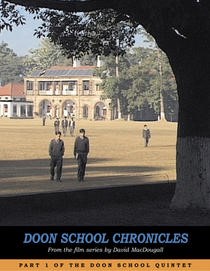| The Doon School Quintet | |
|---|---|
 Poster of the first film in the series, Doon School Chronicles | |
| Directed by | David MacDougall |
| Produced by | Centre for Cross-Cultural Research, Australian National University CCR Media Works[1] |
| Starring | Students and faculty of The Doon School |
| Edited by | David MacDougall |
| Distributed by | Berkeley Media (North America) Ronin Films (Australia) Royal Anthropological Institute (Europe)[2] |
Release date | 2000–2004 |
Running time | Total (5 films): 494 minutes[3] |
| Countries | India Australia |
| Language | English |
| Part of a series on the |
| Anthropology of art, media, music, dance and film |
|---|
 |
| Social and cultural anthropology |
The Doon School Quintet is a five-part ethnographic film series made by the American visual anthropologist and documentary filmmaker David MacDougall, between 1997 and 2000, at The Doon School, an elite all-boys boarding school in India.[4][5] For thirteen months over three years, MacDougall lived with the students and was given unprecedented access for filming inside the residential campus.[6] By the end, MacDougall had more than 85 hours of material, which he edited into 5 parts, with a total duration of about 8 hours. The project ranks among MacDougall's most ambitious and longest works and is the only film series in his oeuvre (the 1977-81 Turkana Conversations trilogy was co-directed with his work partner and wife, Judith MacDougall).
The films were released between 2000 and 2004, and are titled Doon School Chronicles (2000), With Morning Hearts (2001), Karam in Jaipur (2001), The New Boys (2003), and The Age of Reason (2004). In addition to studying the boys' daily lives at Doon, considered the most prestigious boys' boarding school in India, the films examine the ideology and "social aesthetics" of the school, its mix of privilege and egalitarianism, and its role in Indian postcoloniality and the emergence of a new Indian elite.[7][8]
The films have been praised and noted for their significant contribution to the genres of anthropological documentary and ethnographic film. In 2005, anthropologist and professor at Temple University, Jay Ruby, described the project in the review paper The Last 20 years of Visual Anthropology: "MacDougall’s recent work on the Doon School in India and my digital ethnographic work on Oak Park (Ruby 2005) are attempts to continue an exploration that began with Rouch (Jean Rouch). The Doon School project in India by David MacDougall is perhaps the most noteworthy digital ethnographic film project."[9]
- ^ "CCR Media Works". BFI.[dead link]
- ^ Vaughan, Dai (1 October 2005). "The Doon School Project". Visual Anthropology. 18 (5): 457–464. doi:10.1080/08949460590958428. S2CID 145180142.
- ^ "The Doon School Quintet | Berkeley Media".
- ^ "Mr David MacDougall". researchers.anu.edu.au.
- ^ "Film : 'Doon School Chronicles' – RAI Ethnographic Film Catalogue". 23 September 2022.
- ^ MacDougall 2006, p. 114: "I was fortunate to have the trust of the new headmaster, who gave me the run of the school. I was allowed to live there, take my meals with the students, and film where and what I wanted."
- ^ "Doon School Chronicles (1999) - The Screen Guide - Screen Australia". www.screenaustralia.gov.au.
- ^ "Doon School Project Films (5 Parts) · British Universities Film & Video Council". bufvc.ac.uk.
- ^ Ruby, Jay (2005). "The Last 20 years of Visual Anthropology: A Critical Review". Visual Studies. 20 (2): 161, 167. doi:10.1080/14725860500244027. S2CID 31585321.
